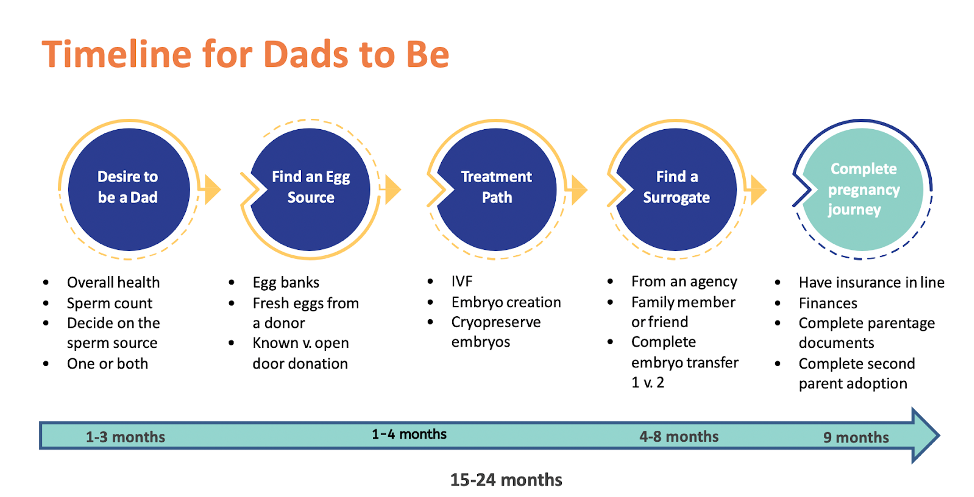

If you’re considering the surrogacy process, I know that there are so many questions passing through your head right now...
“How does this whole process even work? How many people will be involved in my family building journey? When will I get to meet my future child?”
Here at Gay Parents To Be, we have years of experience helping dads-to-be grow their family, so we know the ins and outs of the intricate surrogacy process, including how long it can take. We also know how long that can feel when you’re waiting for your family building dreams to be realized.
In this blog, we’ll explain the fastest possible timeline for a surrogacy journey, some obstacles that can increase the timeframe for the process, and give you an honest answer to how quickly you can expect to bring home your bundle of joy from the hospital.
Surrogacy Refresh - The Surrogacy Process for Gay Men
In case you’re relatively new to the surrogacy process, here’s some basic information you need to know:
For a single male or cisgender male couple, biological family building (where one or both dads are genetically related to their children) requires the help of several special individuals, but most importantly, an egg donor and a gestational carrier, or surrogate. Your journey will also require a licensed fertility doctor, or reproductive endocrinologist, as well as a surrogacy agency or reproductive attorney, and a whole support team of mental health professionals and care specialists to make your family building goals a reality.
It sounds complicated, but by choosing an experienced fertility center, and a surrogacy agency with proven results, you will be able to sit back, relax (as much as possible), and know that your surrogacy journey is being handled responsibly.
How Long Do the First Surrogacy Steps Take?
The first step of the surrogacy process for most dads-to-be, after doing your online research, is to complete a consultation with a fertility clinic, or a surrogacy agency. It’s completely fine to start your journey with either of these two critical pieces. Fertility clinics and surrogacy agencies typically have referral networks, so no matter where you start, it is likely that organization will help you find a counterpart.
During your initial consultations, you will be asked about your family building goals, personal health or family medical history, and will begin to build a plan with the help of an experienced, professional team. Make sure that you ask any questions that you may have and be honest with yourself about how you feel about the provider’s tone, personality, and communication style. You will be working with both of these organizations for quite some time, so feeling comfortable with your fertility specialist, and surrogacy agency is important.
After completing a consultation with a fertility doctor, your next step will be to complete some basic fertility assessments. The Dad(s) that plan to be genetic-intended fathers will need to complete a semen analysis, to make sure that you don’t have any male-factor fertility issues. The only prerequisites for the test are that you must abstain from ejaculation for 2-5 days prior to the test, so it does not take too much time to prepare! While it may take a few days or weeks to get an appointment at a clinic local to you, the results of this test usually return within one week.
Timeline for fertility testing: a few days – 2 weeks
How Long Does It Take to find an Egg Donor?
The next step in your family building journey is to select, screen, and successfully match with an egg donor. Your egg donor is the young woman who will go through a cycle of fertility medication and then an egg retrieval – those eggs will be used to create embryos, and as a result this woman will be genetically linked to your child. While some dads complete the egg donor selection process quickly, this decision can take some time for other dads, especially if you have specific traits or characteristics that you desire in a donor.
It can also take some additional time for your fertility clinic to comprehensively screen your chosen donor if you choose a donor from an outside egg donor agency. For most dads to be, the egg donor selection and screening process takes a few months.
Timeline for egg donor selection & screening: 1-3 months
How Long Does the IVF Process Take for Gay Men?
After selecting your egg donor, the next step is to create embryos in the IVF laboratory. The embryology team at your IVF lab will combine sperm from either one or both dads, combine it with donor eggs on the day of your donor’s egg retrieval, and then wait to see how they grow over a few days.
You can choose to genetically test your embryos at this point in time, using a process called PGT-A (preimplantation genetic testing for aneuploidy). This test checks that those created embryos are chromosomally normal. While the test can detect chromosomal abnormalities such as Down Syndrome, it can also give the embryology team a better idea of which embryo has the best chances of a successful pregnancy. PGT-A testing does take a little bit of time on the front end, but it can save both the time and cost of having to potentially complete another embryo transfer or full IVF cycle.
Although the IVF process itself is typically the length of a normal menstrual cycle, the total time between your egg donor’s treatments and implantation-ready embryos can be up to three months.
Timeline for IVF cycle: 1-3 months
How Long Does it Take to Match with a Surrogate?
For many dads, surrogacy is a process that involves some multitasking, especially when it comes to matching with a surrogate. Your gestational carrier, or surrogate, is a well-screened woman who has successfully delivered her own baby before, who will carry a pregnancy to term and deliver your baby. Your surrogate is not genetically linked to your future child, but she will play an important role in your conception story. While some dads start the surrogacy process with a friend or relative in mind who has volunteered to carry the pregnancy, the majority of dads-to-be match with a surrogate using a surrogacy agency.
It’s important to note that even if you find a surrogate independently, most fertility clinics will require that you work with an agency or reproductive attorney to make sure your rights, the rights of your surrogate, and your future child’s rights are all legally protected.
Your surrogacy agency will provide you with surrogacy candidates based on criteria that you provide, and the match process proceeds from there. Remember, surrogacy is a trust-based two-way relationship – your surrogate needs to feel comfortable with you, as well!
We’ll be honest, this part of the process can have the most widely variable timeframe – it can take anywhere from four to over six months to complete a match with a gestational carrier.
Timeline to match with a surrogate: 4-8 months
How Long Does it Take for My Surrogate to Get Pregnant?
After fertilization, your embryos will be supervised in the lab for 3-5 days. Then, you can either do a fresh embryo transfer, or cryopreserve your embryos for a transfer date in the future. Cryopreservation is a fancy way to say “freezing,” and it is a great way to buy more time as you search for your surrogate match, or allow your clinic and surrogacy agency to coordinate all of these moving pieces. Don’t worry, embryos can be frozen for years before becoming a safe pregnancy and healthy baby!
On the day of embryo transfer, an embryo will be placed in your surrogate’s uterus as she (and hopefully you, too!) watch on ultrasound. This part doesn’t take much time at all, but it can be difficult for what comes next. You and your surrogate, as well as your fertility clinic and surrogacy agency, will wait with bated breath for 11-12 days before a pregnancy can be detected.
Timeline for pregnancy test: 11-12 days
How Long Does a Surrogacy Pregnancy Last?
You guys know this one! The rest of your surrogacy journey is the 9 months of pregnancy, just like any other pregnancy. During this time you and your surrogate will communicate regularly, and also will probably talk to your lawyer or surrogacy agency about your birth plan and any legal documents that need to be drawn up. These may include a pre-birth order, second parent adoption, or acknowledgement of parentage, depending on what state you live in and where your surrogate is planning to give birth.
This is an exciting time to bond, so make the most of it! You will be staying up with your new baby changing diapers and giving bottles before you know it.
Timeline for pregnancy: 9 months
What Factors Can Make the Surrogacy Process Longer for Gay Men?
There are a few things that can make the surrogacy process a little longer than you expect – but don’t worry. All of these are surmountable obstacles that you, your fertility clinic, and surrogacy agency will handle should they arise.
- Semen analysis results – If the results of your semen analysis are less than optimal, your fertility doctor may recommend that you change some of your habits or take a supplement for a few months to improve those results.
- Travel – If you, your partner, or your donor has traveled to a tropical area, such as a Zika zone, there may be some restrictions on how soon you can use your gametes to create embryos. Let your fertility clinic know if you have any travel planned that may affect your family building timeline.
- Egg Donor Selection – Sometimes it can take longer to match with an egg donor if both you and your partner are hoping to be genetically intended fathers. In this instance, your clinic will likely help you select an experienced donor, who will produce enough eggs that they can fertilize half with your sperm, and half with your partner’s sperm. While this is a very common practice, it may take slightly longer to match with the donor that’s right for you.
- Surrogate matching – There are many criteria that can make the surrogate matching process take a little bit longer, such as desiring a surrogate who lives locally or one who will eat only organic foods. It’s important that your surrogacy agency know what’s important to you, so they can provide you with the best surrogate match, but you should know that the match process may be slower.
- Finances – Surrogacy costs are not insignificant and are the greatest barrier that most dads-to-be encounter. Whether you’re taking out a loan, applying for grants, or just have to take some time to save money, finances are a big factor when it comes to your surrogacy timeline.
So How Long Does the Entire Surrogacy Process take?
As you may have noticed, each of the steps above can take a varying amount of time, depending on your time, financial resources, and other factors that may be personal to you. On average though, the TOTAL surrogacy process can take anywhere from 15 to 24 months. If you’re looking to dial in on the exact stages of surrogacy now that you understand the timeline, we’ve outlined the four major steps here.

Total timeline for surrogacy: 15-24 months
It’s important to understand that your family building journey will happen at your own pace and that there’s no clock that you have to beat. Remember, your fertility clinic, and your surrogacy agency share one common goal – to help you bring home a healthy child, and we will do everything in our power to make sure that happens. We’re all rooting for you, so take a deep breath, and try to take each step of the surrogacy process as it comes.
When you’re ready to start your journey, we’re here to help.
Emma served as Gay Parents To Be's Brand Specialist for many years, helping to build awareness of the brand not only as a direct path to parenthood, but also as a general resource for fertility information in the LGBTQ community.

